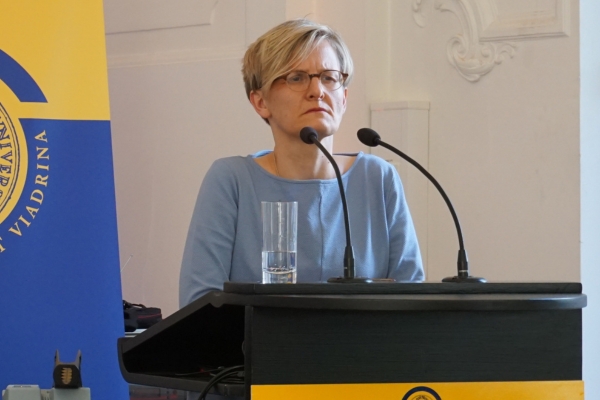Interview with Socrates Prize winner and Viadrina Visiting Scholar Tetiana Kyselova
Congratulations on being awarded with the Sokrates-Preis. Does an award like that, primarily symbolic in nature as it is, mean anything to your network even against the background of ongoing war atrocities?
Tetiana Kyselova: We are grateful for the trust of the jury to award an established prize to a relatively new actor. Although Ukrainian mediators and dialogue facilitators have been working for decades, it was not until 2022 that they have mobilized in a peacebuilding network with clear goals and joint actions. We hope that the award will turn out to not merely be of symbolic nature, but that it will help us to open doors in Germany and Europe, adding credibility to and trust into the network. We appreciate the recognition of the work of the Community very much and we are confident that it will support the very concrete tasks of strengthening social cohesion and resilience of Ukraine in the face of on-going war.

We understand the CoP is an inclusive network of conflict management professionals consisting of more than 25 Ukrainian organizations from a wide field of society. Could you capture the essence of the CoP’s aims for us?
The Community of Practice of Mediators and Dialogue Facilitators is indeed an informal network without formal membership. It unites professionals in mediation, dialogue facilitation and peacebuilding who used to work in different fields – from business mediation to community dialogues – and now concentrate their efforts on dealing with the current situation of war. The ultimate goal of such response is that Ukraine becomes more resilient to withstand Russian aggression and build a sustainable peace. Therefore the CoP is working on the ground level in the shelters for internally displaced people, local communities and schools through integrated psycho-social and mediation help; at the policy level inside Ukraine – to promote people-centered Transitional Justice and facilitate dialogue on these matters between the government and civil society; at the political level by rethinking approaches to Russian-Ukrainian dialogues and conducting international advocacy for context-sensitive approaches to peacebuilding in Ukraine.
One of the many achievements of the network is that shortly after the war started, you managed to „act with many hands“ but at the same time „speak with one voice“: How could that work?
The CoP as a network promotes two types of action. First, it supports action by individual CoP members helping them to secure funding and international outreach for their projects. This is the help “for many voices” and it follows the lead by the local NGOs and activists from the ground. Second, in the matters of joint interest and where efforts of one organization are clearly not sufficient, the CoP promotes “a single voice” through joint action of many CoP members. These were, for example, our Public Statements “7 Points on the war and Dialogue” and Ukraine Peace Appeal 2023 (document can be found here, editor’s note) which were accompanied by information campaigns in social media internationally. “One voice” of the professional community is also developing through knowledge production projects – methodologies of dialogue and trauma-sensitive work, methodology of dialogue evaluation, etc.
If we may, one last, slightly more personal question on your own steps after February 2022: From March 2022 on, you spent time as a Researcher-in-Residence at Viadrina‘s Institute for Conflict Management, then started to work also in the Ukraine program at swisspeace in Switzerland. But then you decided to partially re-locate your activities back to Kyiv, shuttling back and forth. How would you describe your current life, its roles and challenges?
I have never stopped working in Kyiv, I have been teaching my students online and working with mediators and dialogue facilitators already in the first months of the invasion. But what was really crucial was the support of the European University Viadrina during the first days of the invasion. Already when I was evacuating my children and two other families in the train from Lviv to Poland on the 28th of February, I have received a message from my colleagues at Viadrina’s Institute for Conflict Management with the news that I was awarded a fellowship to come to Frankfurt (Oder). The whole train was going into nowhere, and I was going to Viadrina, to a place where we were waited for. This was a turning point because all the other help came in much later. The Viadrina fellowship really determined my future and allowed me not to break down. And in two weeks the colleagues in Ukraine have launched the first project to help internally displaced people in shelters and I was able to help them with funding. We continue to work towards real peace in Ukraine but that crucial support from Viadrina will always remain in my heart.
Interview: Lars Kirchhoff